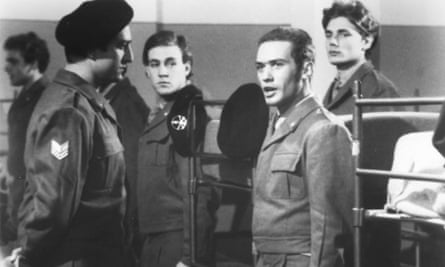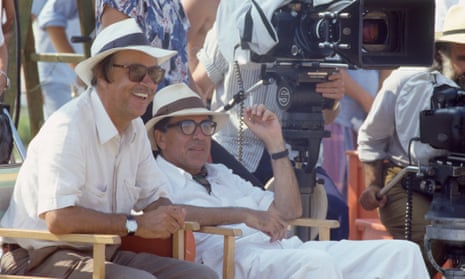Vittorio Taviani, who has died aged 88, was the elder of the two Taviani brothers, the film-making duo who enjoyed great acclaim and success in the 1970s and 80s. With his brother Paolo, two years his junior, he wrote and directed more than 20 films. The brothers were said to work harmoniously as one. “We have different characters but the same nature,” Vittorio said in 2012. Marcello Mastroianni, who starred in their 1974 drama Allonsanfàn, addressed the brothers as “Paolovittorio.” Asked at the end of the shoot what it was like to take direction from two people, he replied: “There were two of them?”
The Tavianis won the Palme d’Or at Cannes for their 1977 masterpiece Padre Padrone, shot on 16mm for Italian television. This odyssey of rural hardship was adapted from the memoir of the linguist Gavino Ledda, son of a brutal Sardinian farmer, and elevated by its unusual mix of neorealist earthiness and Brechtian theatricality. In the film’s opening scene, for instance, the real Ledda hands a stick to the actor playing his on-screen parent: “My father was carrying this,” he says.
Ledda appears at the end also, to close the book on the adaptation of his life. In between are coarsely poetic passages outlining his journey from mental and physical impoverishment to emancipation through music and language. The film has an appealing playfulness, eavesdropping on the internal monologues of humans and animals alike.

There was a special poignancy to Padre Padrone’s Cannes triumph: the jury president that year, arguing passionately in the film’s favour, was Roberto Rossellini, whose neorealist picture Paisan, about the allied liberation of Italy, had first inspired the brothers to become directors. They were born and raised in San Miniato, Tuscany, by liberal, anti-fascist parents who used art and culture as rewards: their father, Ermanno, a lawyer, took them to the opera when their grades were good. Their mother, Jolanda (nee Brogi), was a teacher.
They got along well enough until their teens. “There was a period during adolescence when we both hoped the other would die in a car crash,” Vittorio said. “I used to write plays that contained two brothers, one perfect, the other one evil.” After the war they attended university in Pisa, where Paolo studied liberal arts and Vittorio read law. While there, they saw Paisan together. “It was such a shock in our lives, such a turnaround, because we watched our own tragedy that we’d lived through being re-enacted on screen. By seeing it, we understood better the times we had lived through.” Leaving the cinema, they vowed that, if they were not making their own films within a decade, they would buy a gun and kill themselves.
Before their self-imposed deadline was up, they completed a short film: San Miniato, July 1944 (1954), about a massacre carried out by the Germans in the Tavianis’ home town. They co-directed with Joris Ivens the 1960 documentary Italy Is Not a Poor Country and teamed up with Valentino Orsini to co-direct A Man to Burn (1962) and Outlaws of Love (1963) before branching out on their own with The Subversives (1967), which traced the impact of the death of the communist leader Palmiro Togliatti.
St Michael Had a Rooster (1972), adapted from Tolstoy’s Divine and Human, was the first of a string of literary adaptations that also included Kaos (1984) and You Laugh (1998), both based on stories by Pirandello, The Sun Also Shines at Night (1990), based on Tolstoy’s story Father Sergius, and a film of Goethe’s Elective Affinities (1996).
After Padre Padrone, the other pinnacle of their career was The Night of the Shooting Stars (1982), a pastoral wartime drama shot through with fantasy and black comedy, and set in 1944 in a Tuscan village poised to be snatched away from the Germans by approaching US troops. The New Yorker critic Pauline Kael, who had been part of Rossellini’s Cannes jury, received the new film just as rapturously: “The Tavianis make stylised unreality work for them in a way that nobody else ever has; in Shooting Stars, unreality doesn’t seem divorced from experience (as it does with Fellini) – it’s experience made more intense.”
Good Morning Babylon (1987), about set designers working for DW Griffith, felt less assured, perhaps because of the English-language script and the use of Italian and Spanish locations standing in for American ones.
Their last great work was Caesar Must Die, which won the Golden Bear at Berlin in 2012. This unorthodox adaptation of Julius Caesar was shot inside Rebibbia prison in Rome and performed by hardened lifers, many of them former mafia and Camorra hitmen. Searching and powerful, it was above all compassionate.
“We could sometimes look in the eyes of the inmates while they were acting and see that those eyes had witnessed murder in real life,” said Vittorio. “From behind the camera, we saw them as the children they once were, whooping and jumping around. By the same token, we hate with all our might what the mafia and Camorra and so on have done. How can we put these equally strange emotions together? We still don’t know how to resolve that.”
The last film directed by both brothers was Wondrous Boccaccio (2015), adapted from stories by the Italian writer. Rainbow: A Private Affair (2017), based on Beppe Fenoglio’s 1963 novel set in wartime Italy, was directed by Paolo alone, due to Vittorio’s poor health, though it was presented as the work of both men.
He is survived by his wife, Carla (nee Vezzoso), and by their children, Giovanna, Francesca and Giuliano, as well as by Paolo.

Comments (…)
Sign in or create your Guardian account to join the discussion